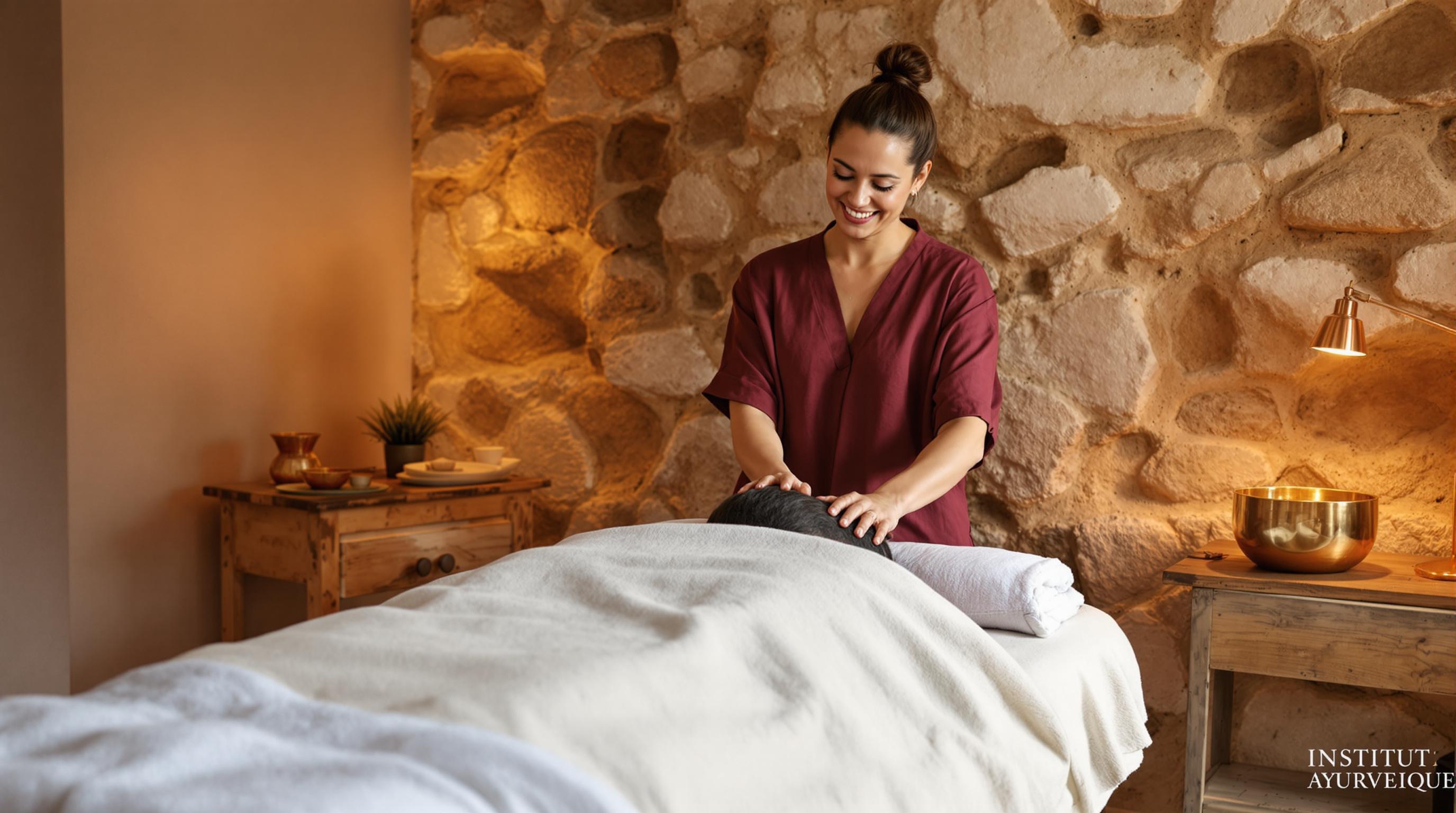Understanding authentic Ayurvedic wellness
Ayurveda, the ancient "science of life" originating over 5,000 years ago, forms the foundation of authentic wellness experiences at India's premier retreats. This holistic medical system operates on the principle that true health emerges from perfect balance between mind, body, and spirit.
The cornerstone of Ayurvedic practice lies in understanding the three doshas: Vata (air and space), Pitta (fire and water), and Kapha (earth and water). Each individual possesses a unique constitutional makeup, or Prakriti, determined by these elemental forces. Authentic Kerala Ayurveda centers like Kairali employ traditional diagnostic methods, including pulse reading and detailed consultations, to identify doshic imbalances.
Genuine Ayurvedic retreats create customized treatment plans based on individual constitution and current health conditions. These personalized programs may include Panchakarma detoxification, specialized diets, herbal medications, yoga, and meditation practices. The integration of these elements ensures optimal results, as treatments address root causes rather than mere symptoms.
Traditional Kerala practitioners emphasize the importance of Dinacharya (daily routine) and seasonal regimens in maintaining health. This comprehensive approach, combining ancient wisdom with personalized care, distinguishes authentic Ayurvedic wellness from generic spa treatments.

Top luxury Ayurvedic destinations in India
India's diverse landscape offers exceptional luxury Ayurvedic retreats that seamlessly blend ancient healing traditions with world-class hospitality. Each destination provides unique therapeutic experiences tailored to individual constitutional needs.
Ananda in the Himalayas stands as one of India's most prestigious wellness retreats, nestled in the serene Himalayan foothills of Dehradun. This luxury sanctuary specializes in comprehensive Ayurvedic programs combining traditional therapies with Vedanta philosophy, offering guests personalized healing journeys amid breathtaking mountain vistas.
In Kerala's lush backwaters, Kalari Kovilakom transforms a historic royal palace into an authentic Ayurvedic healing center. Guests undergo detailed consultations with experienced Vaidyas who craft bespoke treatment protocols, including intensive Panchakarma programs and specialized rejuvenation therapies.
Six Senses Vana in Dehradun represents the pinnacle of holistic wellness, integrating Ayurveda with Tibetan healing and modern diagnostics. The 42-acre property features personalized wellness consultations, meditation pavilions, and access to visiting spiritual teachers.
Kairali - The Ayurvedic Healing Village in Palakkad offers an immersive 65-acre sanctuary surrounded by coconut groves. This NABH-certified retreat provides farm-to-table Ayurvedic cuisine, traditional therapies administered by skilled practitioners, and accommodations designed according to Vastu principles for optimal healing energy.

Signature Ayurvedic treatments and therapies
The heart of any luxury Ayurvedic retreat lies in its therapeutic treatments, each designed to restore balance and promote deep healing. These time-honored therapies combine ancient wisdom with modern luxury, creating transformative experiences that address both physical ailments and spiritual well-being.
Panchakarma detoxification represents the pinnacle of Ayurvedic healing, literally meaning "five actions" in Sanskrit. This comprehensive 21-28 day program systematically eliminates toxins from the body through specialized procedures including Vamana (therapeutic vomiting), Virechana (purgation), Basti (medicated enemas), Nasya (nasal administration), and Raktamokshana (bloodletting). At retreats like Kairali and Soukya, expert practitioners guide guests through this profound cleansing process, often resulting in dramatic improvements in chronic conditions and overall vitality.
The treatment journey begins with an extensive consultation with qualified Ayurvedic doctors who assess your unique constitution (Prakriti) and current imbalances (Vikriti) through pulse diagnosis, tongue examination, and detailed lifestyle analysis. This personalized approach ensures that every therapy is tailored to your specific needs and dosha composition.
Rejuvenation therapies form another cornerstone of luxury Ayurvedic treatment. Abhyanga, a synchronized four-hand oil massage using warm medicated oils, promotes circulation and deep relaxation. Shirodhara, where a continuous stream of warm oil is poured over the forehead, calms the nervous system and enhances mental clarity. At premium retreats like Ananda in the Himalayas, these treatments are performed in serene settings with skilled therapists trained in traditional techniques.
Specialized stress management programs address modern lifestyle challenges through targeted therapies. Treatments like Ksheeradhara (therapeutic milk bath) and Pizhichil (oil bath) specifically target anxiety and mental fatigue. The integration of meditation, breathing exercises, and herbal medications creates a comprehensive approach to emotional well-being.
Advanced treatments include Karna Purana for ear-related issues, Akshi Tarpana for eye health, and Udvartana powder massages for weight management. Each therapy follows strict protocols regarding duration, oil selection, and post-treatment care, ensuring maximum therapeutic benefit while maintaining the highest standards of luxury and comfort.
Holistic wellness experiences beyond treatments
Luxury Ayurvedic retreats in India offer transformative experiences that extend far beyond traditional treatments. These sanctuaries create comprehensive wellness journeys through carefully curated complementary activities designed to enhance the healing process.
Yoga and meditation practices form the cornerstone of the retreat experience. Properties like Ananda in the Himalayas provide personalized yoga sessions covering asanas, pranayama, mudra, and bandha techniques. Morning meditation sessions by the Arabian Sea at facilities like Nattika Beach Ayurveda Hospital create profound states of relaxation that complement therapeutic treatments.
Spiritual ceremonies and cultural immersion add deeper meaning to the wellness journey. Retreats offer sacred Vedic fire rituals, evening Ganga Aarti ceremonies, and chanting sessions in meditation halls adorned with Hindu deities. These experiences help guests connect with India's ancient spiritual traditions while supporting their healing process.
Organic cuisine and culinary education play crucial roles in the holistic approach. Retreats like Kairali feature farm-to-table dining with ingredients grown in organic gardens, while properties such as Neeleshwar Hermitage offer Keralan cookery classes. The food follows Ayurvedic principles, with dosha-specific menus and the avoidance of processed ingredients.
Wellness workshops and lifestyle education provide valuable knowledge for long-term health. Guests learn about Dinacharya (daily regimens), Ritucharya (seasonal regimens), and traditional cleansing practices like neti pot usage and oil pulling. These educational components ensure the benefits of the retreat experience continue well beyond the stay.
Seasonal considerations and best times to visit
Understanding India's diverse climate patterns is crucial for maximizing the benefits of your Ayurvedic retreat experience. Each region offers unique advantages depending on the season, with treatments and program availability varying significantly throughout the year.
Kerala's monsoon season (June to September) presents both challenges and opportunities. While the rains create lush, therapeutic environments perfect for rejuvenation, they can limit outdoor activities and affect travel logistics. However, many retreats like Somatheeram and Kalari Kovilakom continue operating during this period, offering intensive Panchakarma treatments at reduced rates when the humid climate enhances oil absorption and detoxification processes.
The post-monsoon period (October to March) represents Kerala's peak season for Ayurvedic treatments. The weather remains pleasant while maintaining sufficient humidity for effective oil-based therapies. This timing allows for optimal treatment outcomes combined with comfortable accommodation in properties like Neeleshwar Hermitage.
Mountain retreats in North India offer distinct seasonal advantages. During summer months (April to June), destinations like Ananda in the Himalayas and Six Senses Vana provide cool, refreshing escapes from India's heat. The crisp mountain air enhances respiratory treatments and meditation practices, while properties like Taj Rishikesh offer serene Ganges-side healing experiences.
Winter months (December to February) suit most regions, with specialized programs like immunity-boosting treatments and detoxification therapies being particularly effective during this period when the body naturally seeks warming and strengthening support.
Preparing for your Ayurvedic retreat journey
Proper preparation is essential for maximizing the transformative benefits of your Ayurvedic retreat experience. Understanding what to expect and how to prepare both mentally and physically will enhance your healing journey and ensure you derive the most value from your investment in wellness.
Essential packing considerations for an Ayurvedic retreat differ significantly from typical vacation preparations. Pack comfortable, loose-fitting cotton clothing in natural fabrics that allow your skin to breathe during oil treatments. Bring minimal jewelry and avoid synthetic materials that can interfere with therapy effectiveness. Most retreats provide treatment garments, but having your own comfortable loungewear is beneficial for relaxation between sessions.
Mental preparation forms the foundation of successful Ayurvedic healing. Begin cultivating a mindset of openness and surrender at least two weeks before departure. Ayurvedic treatments work holistically, addressing not just physical symptoms but emotional and spiritual imbalances. Practice daily meditation or mindfulness exercises to prepare your mind for the introspective journey ahead. Set clear intentions for your retreat, whether focused on detoxification, stress relief, or addressing specific health concerns.
Dietary adjustments before arrival significantly impact treatment efficacy. Start reducing processed foods, caffeine, and alcohol consumption 7-10 days prior to your retreat. Increase your intake of warm, easily digestible foods like soups, stews, and cooked vegetables. This preliminary cleansing prepares your digestive system for the specialized Ayurvedic diet you'll follow during treatment. Dr. Barthwal from The Palms recommends beginning with simple practices like drinking warm water with lemon each morning to stimulate digestion.
Treatment duration recommendations vary based on your wellness goals and the specific program chosen. Traditional Panchakarma detoxification requires a minimum of 14-21 days for optimal results, while stress management and rejuvenation programs can be effective in 7-14 days. Shorter programs of 3-5 days, while beneficial, primarily offer relaxation rather than deep systemic healing.
Post-treatment care is crucial for maintaining the benefits gained during your retreat. Continue following the dietary guidelines provided by your Ayurvedic physician for at least one month after returning home. Maintain regular oil massage practices, even if simplified, and preserve the meditation or yoga routines established during your stay. Many retreats like Ananda in the Himalayas provide detailed post-treatment protocols to help guests integrate their experience into daily life, ensuring lasting transformation beyond the retreat environment.
